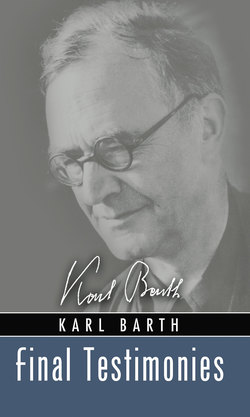Читать книгу Final Testimonies - Karl Barth - Страница 5
На сайте Литреса книга снята с продажи.
ОглавлениеTRANSLATOR’S PREFACE
Particular weight and solemnity has always been attached to last words. It is for this reason rather than for any outstanding merit or originality that Karl Barth’s final testimonies to the gospel command our interest. What were the things on his mind when life was obviously drawing to a close? What did he most want to say or stress within the confines of his specific assignments? Where is the essential core of his thinking and message?
Perhaps the first of the chosen pieces brings us closest to the heart of the matter. When asked to testify to what Christ means to him, Barth answers clearly and boldly but refuses to be pressed into a purely individualistic or private statement. Christ means to him what he means to all others. Even in the most personal confession he thus preserves the sense of community, not just in the sense of “for me and for all others too,” but in the sense of “for all others and for me too.”
The other statements express no less typical Barthian themes. Love of Mozart goes hand in hand with a first and last conviction that theological work serves the preaching and pastoral ministry. Authentic liberalism is to be espoused and not opposed, and church matters, including theology, are for all Christians, not for clergy as distinct from laity. The Roman and Reformed churches can grow together ecumenically as the former develops the ministry of the word and the latter the complementary ministry of the sacrament. The pattern of church life must be one of ongoing moving forward which is also a moving back, of constant exodus and conversion, in which the abiding factor is confession of the one Lord Jesus Christ.
The old humor is there, the element of surprise, a little more reminiscing, as one expects in the old, and the kindly spirit which gradually replaced the early pugnacity. The words are simple, and they add little to what Barth has said in his previous writings. But behind them stands a wealth of thought and experience endowing them with a peculiar poignancy and force.
It is fitting—perhaps even symbolic—that the last of these final pieces breaks off in the middle of a sentence. Barth had always recognized that theology can never achieve a final utterance. His masterpiece, the Church Dogmatics, remained a magnificent but uncompleted fragment. The last word, after all, cannot be spoken by us. It has to be spoken to us by him who speaks the last word as well as the first.
The words of Karl Barth are ended, but the Word of God which he attempted to serve lives and endures forever.
Pasadena
G. W. Bromiley
